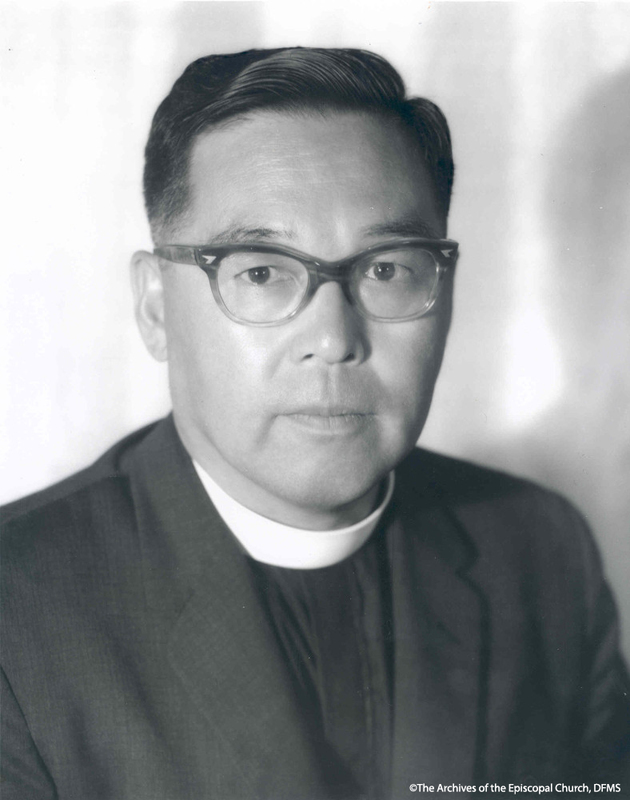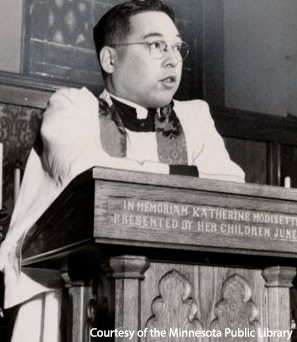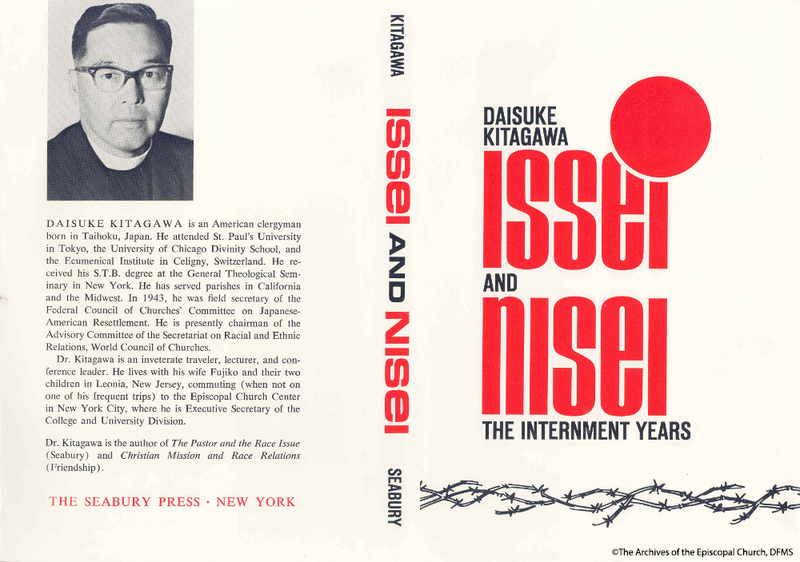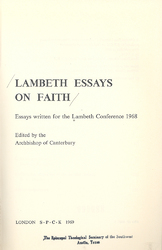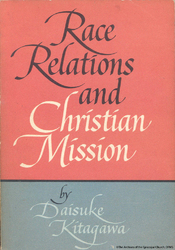Leadership Gallery
The Reverend Daisuke Kitagawa, 1910-1970
The ordained ministry of Reverend Daisuke Kitagawa, a leading voice in the area of racial justice and understanding, spanned a 31 year period and crossed several continents in the pursuit of his life long commitment to Ecumenism and Christian social ministry. Born in Taihoku, Japan on October 23, 1910, Kitagawa graduated from St. Paul’s (Rikkyo) University in Tokyo, in 1933. He emigrated to the United States in 1937, and attended General Theological Seminary. Together with his younger brother Joseph, who followed him to the United States a few years later, the Kitagawas were transitional figures in an Americanized Japanese community.
Daisuke Kitagawa began his ministry in 1938 at St. Peter’s Mission in Seattle and St. Paul’s Mission in Taylor in the Diocese of Olympia. With the removal of Japanese Americans to the relocation camps in the spring of 1942, Kitagawa became priest-in-charge of Episcopalians in the Tule Lake Relocation Center in Newell, California where he observed critically, but without bitterness, the camp’s devastating impact on the young Japanese (the Nisei). The experience forged his lasting belief in the universal Church's agency in a vital gospel ministry of social and cultural healing. His internment gave him a global perspective on racism that transcended domestic Black/white issues. For him, the missionary obligation to oppose racism was the same at home and abroad. In dialogue with Black, white, and Asian people, he analyzed racial issues around the world.
The Reverend Daisuke Kitagawa speaking at St. Mark’s Church, Minneapolis, c. 1949.
Father Kitagawa reflects on the ability of otherwise kind and rational people to be swayed by mob prejudices, connecting his own internment during WWII to the problem of racism in the 1960s, 1965.
Before the war’s end, Kitagawa had arrived in Minneapolis, having married Fujiko Sugimoto in Chicago in 1944. He ministered to evacuated communicants as well as the bilingual soldiers being turned out by the Military Intelligence Service School. He had his earliest experiences in inter-denominational cooperation when he was appointed director of the Minneapolis Council of Churches which organized the Christian church’s response to the thousands of Japanese Americans who were released from the various internment camps. In 1949 Kitagawa became director of the Japanese American Community Center, established with the assistance of the national Episcopal Church and the Diocese of Minnesota, which hosted the activities of the Japanese American community including weekly church services for the Japanese-speaking older generation. The Nisei, without language problems, attended services in the various established churches in the community, but many of their social activities were held at the Community Center. The Center was also used by the Native American community of the Twin Cities, which held weekly pow-wows there on Sunday afternoons.
Daisuke Kitagawa served for several years on the Mayor’s Council on Human Relations, during which time he organized the Rainbow Club. The members of the Rainbow Club were from various racial backgrounds and met as families in the hope that both children and adults would develop friendships across racial lines.
Kitagawa remained in Minneapolis until 1954, when he resumed doctoral studies at the University of Chicago. In 1956 he began the first of his two associations with the World Council of Churches (WCC) serving in the Department of Church and Society in the Division of Studies and as Secretary of Racial and Ethnic Relations from 1960 to 1962. In 1962 Kitagawa took up service with the national Church, serving as executive secretary of the Division of Domestic Mission. Six years later, he was appointed the Secretary for Urban and Industrial Mission Program in the Division of World Mission and Evangelism of WCC. He traveled extensively in Africa and Asia.
The author of several books, including The Pastor and the Race Issue, Race Relations and Christian Mission, and Issei and Nissei: The Internment Years, Daisuke Kitagawa died in Switzerland on Good Friday, 1970. [Sources]


